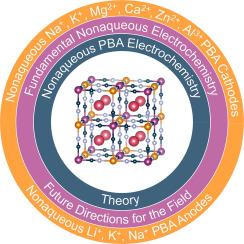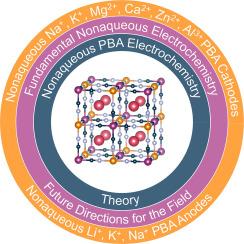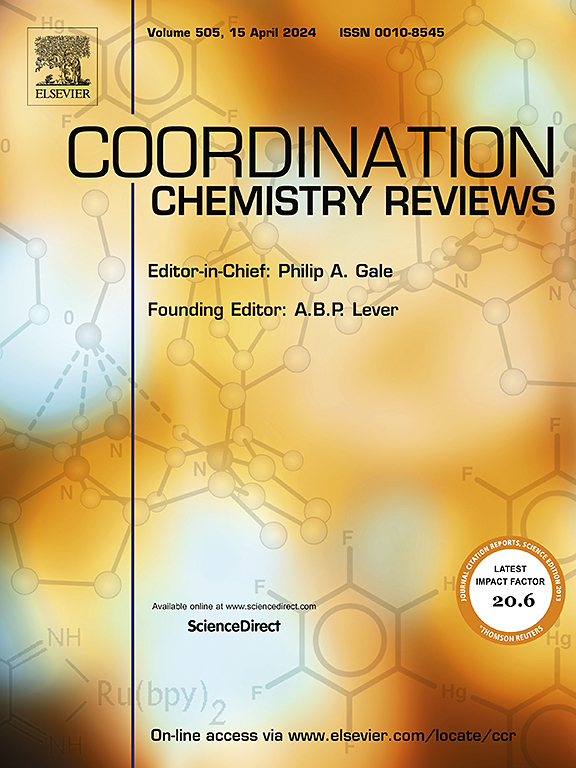Nonaqueous electrochemistry of prussian blue analogs: Synthesis, fundamental studies, and applications in battery chemistry
IF 23.5
1区 化学
Q1 CHEMISTRY, INORGANIC & NUCLEAR
引用次数: 0
Abstract
Prussian blue analogs (PBAs) are metal-inorganic frameworks that are ubiquitous in electrochemical sensing, electrocatalysis, and most recently in the spotlight, energy storage and conversion for alternative battery systems. This review compiles a comprehensive summary of PBA nonaqueous synthesis, their employment as cathodes and anodes in PBA-based alkali, alkaline earth, Group 13, and late transition metal batteries, and unique to this article, a chronological account of the fundamental nonaqueous electrochemical characterization of PBAs, much of which precedes the research on PBAs as electrodes for secondary battery technology. While Li-based systems are included for PBA anodes due to a dearth of anode studies, we omit Li-based cathodes to focus on technologies moving cathode architectures away from Li-ion usage. In addition to a comprehensive summary of fundamentals and battery applications, we provide key takeaways that hopefully assist this field in further evolution.


普鲁士蓝类似物的非水电化学:合成、基础研究及在电池化学中的应用
普鲁士蓝类似物(PBAs)是一种金属无机框架,在电化学传感、电催化以及最近在替代电池系统的能量存储和转换中无处不在。本文对PBA的非水合成及其在PBA基碱电池、碱土电池、13族电池和晚期过渡金属电池中作为阴极和阳极的应用进行了全面的综述,并对PBA的基本非水电化学特性进行了按时间顺序的描述,其中大部分是在PBA作为二次电池技术电极的研究之前进行的。虽然由于缺乏阳极研究,锂基系统被包括在PBA阳极中,但我们忽略了锂基阴极,专注于使阴极结构远离锂离子使用的技术。除了对基本原理和电池应用的全面总结外,我们还提供了关键要点,希望能帮助该领域进一步发展。
本文章由计算机程序翻译,如有差异,请以英文原文为准。
求助全文
约1分钟内获得全文
求助全文
来源期刊

Coordination Chemistry Reviews
化学-无机化学与核化学
CiteScore
34.30
自引率
5.30%
发文量
457
审稿时长
54 days
期刊介绍:
Coordination Chemistry Reviews offers rapid publication of review articles on current and significant topics in coordination chemistry, encompassing organometallic, supramolecular, theoretical, and bioinorganic chemistry. It also covers catalysis, materials chemistry, and metal-organic frameworks from a coordination chemistry perspective. Reviews summarize recent developments or discuss specific techniques, welcoming contributions from both established and emerging researchers.
The journal releases special issues on timely subjects, including those featuring contributions from specific regions or conferences. Occasional full-length book articles are also featured. Additionally, special volumes cover annual reviews of main group chemistry, transition metal group chemistry, and organometallic chemistry. These comprehensive reviews are vital resources for those engaged in coordination chemistry, further establishing Coordination Chemistry Reviews as a hub for insightful surveys in inorganic and physical inorganic chemistry.
 求助内容:
求助内容: 应助结果提醒方式:
应助结果提醒方式:


